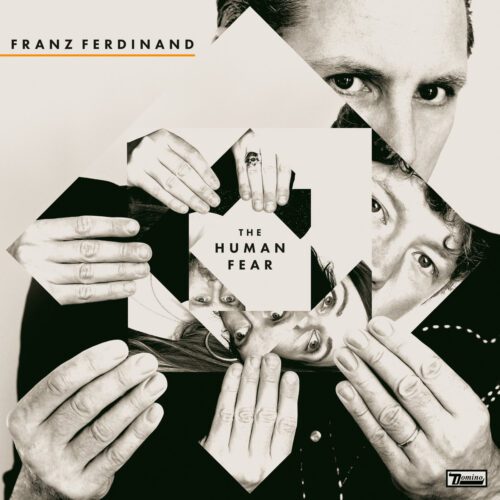Franz Ferdinand, who erupted during the dance frenzy of 00s Brit indie-rock and exploded with You could have it so much better, return after 7 years with The Human Fear, an 11-song album that skilfully blends nostalgia and modernity. Inhabited by a different energy, although faithful to the band’s “rock” and “dance” poles, we find the usual sharp guitar riffs and Kapranos’ raw yet sophisticated vocals, but this time more than ever embellished with the Mediterranean tinge that has stuck to the band’s sound since the beginning. A dynamic album, digging deeper into complexity, even if it means leaving a little punk exaltation behind, always with a touch of good humour. “A bunch of songs searching for the thrill of being human via fears”, as the leader describes it.
From the opening of the rousing “Audacious,” we’re struck by the texture of the voice taking us inexorably back to Julian Casablancas on this power-pop-tinged composition, with the fun organ and its leitmotif-like chorus. Alex’s voice begins a cappella on the inventive, made-for-the-track melody of “Everydaydreamer,” joined by female backing vocals, trumpet and synth adding a bit of 80s to the prog touch. “The Doctor,” also very danceable, stands out for its more alternative character, between Sparks influences and synth-punk jam. The electro-rock “Hooked,” with its EDM-style synth, is refreshing, though may seem stranger to those less familiar with their catalog. The sinuous “Build it up,” one of my favourites on the album, recalls the early days of Franz Ferdinand, embellished with a more-than-necessary speech to share these days and some deft guitar ornamentation. “Night or Day,” the catchiest track on the opus in my opinion, is built on beautiful writing and gripping vocal melody, well wrapped up in the layers of Mark Ralph’s production.
“Tell me I shoud stay” opens with a neo-classical melody on the crunching bench, reviving with Bar Lonely a certain gloss of ’70s glamour, with piano more present than on other albums. and opens on the crunching bench of a neo-classical melody. Throughout, the Mediterranean influence is never far away in the tonalities, progressions and instruments, but never more so than on “Black Eyelashes,” a sort of homage to rebetiko, a Greek musical style in which Alex used the bouzouki to explore his roots. We end on a high note with the hypnotic, post-punk guitar melody of the liberating “The Birds.”
A pounding album, filled with unique synths and danceable guitars, with enough of the early recipe to keep us hooked on that feeling of Britpop optimism that manages to retain its signature while gracefully transitioning into more musical maturity. No longer content to be faithful to their dancefloor new-wave side, the band are now keen to refresh themselves by exploring the outer reaches of their groovy universe. This is one of the band’s best albums, inventive and complex, with just enough of the Franz Ferdinand of yesteryear to plunge with them into the Franz Ferdinand of today, guiding us here to overcome and accept our fears with a touch of self-deprecation.
























